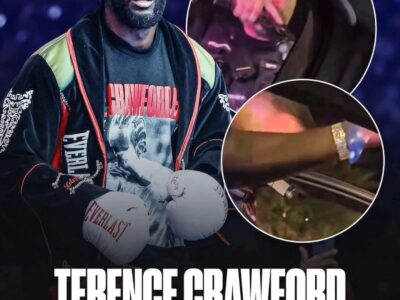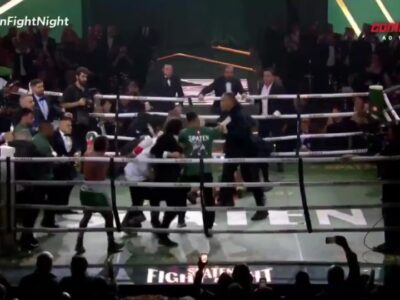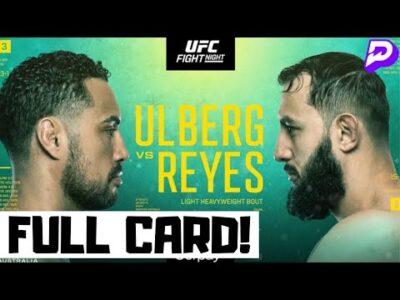
30 Years After Gerald McClellan vs. Nigel Benn, Looking at Root Cause
By Robert Brizel, Head Real Combat Media Boxing Correspondent
In amateur and professional sports, boxing is no exception to the rule when it comes to playing favorites for hometown fighters over visiting challengers. Life, it can be said, is rarely fair, and referees playing favorites are no exception in some cases. That is not to say no foreign fighter has ever won in Great Britain by decision, stoppage or knockout. It is just to say the occurrence is increasingly rare. When Jerry Quarry knocked out BBB of C, British Commonwealth and European Heavyweight champion Jack Bodell at Empire Pool Wembley at 1:04 off the first round in November 1971, that win was clear cut, though the referee failed to give Bodell a count after he got hit, took a knee and got up. That gaff, however seemingly inconsequential, proved a measuring point for British referees who do not follow protocol and procedure in the historical ring context.
While this reporter and others have written about the bout between the then World Boxing Council World Super Middleweight champion Nigel Benn versus Gerald McClellan at London Arena in Millwall in February 1995, this editorial addresses the critical rounds of that bout in which McClellan was permanently injured. The previous brief tale in August 1990 at Bally’s Las Vegas, between the then World Boxing Organisation World Super Middleweight champion Benn and former World Middleweight champion Iran Barkley, stunk out the house.
Benn knocked down Barkley 18 seconds into the first round. Benn threw a left at Barkley on the canvas, then threw a right which hit Barkley as he got up. Barkley got hit on the canvas. No foul call from referee Carlos Padilla Jr., who picked up the count at six. With 27 seconds left in the round, Benn dropped Barkley a second time after an exchange, then hit Barkley with a right hand on the canvas yet again. Barkley went down a third time with six seconds left, forcing Padilla to stop the bout, after looking at ringside officials after the third knockdown under the three knockdown rule in effect.
In reality, Benn should have had a point deduction after hitting Barkley on the canvas the first time, and should have been issued a second point deduction and or a disqualification after hitting Barkley on the canvas the second time. There was no significant rest period, no foul call, nothing. One of the worst refereed rounds ever recorded on television ever seen.
Padilla, age 91, who last refereed a bout with Manny Pacquiao in 2000, is still alive in the Philippines. He remains best known for having refereed and scored ‘The Thrilla in Manilla’ between Muhammad Ali and Joe Frazier in 1975.
Benn figures again into the next worst refereed bout I have ever watched, this time in February 1995 at the London Arena. The referee was Alfred Asaro of France, whose career between 1986 and 2011 included refereeing bouts with Evander Holyfield, Zelijko Mavrovic, David Izon, Pernell ‘Sweet Pea’ Whitaker, Ike Quartey, and Johnny Nelson, primarily in Spain, France, Italy, and Ukraine. He was seen a few times in the United Kingdom. A 1998 featherweight bout he refereed at Royal Albert Hall in Kensington, London between Spenser Oliver and Sergey Devalov ended in permanent brain damage for Oliver. Remember, the Oliver bout occurred three years after Benn versus McClellan
Boxing writer Jake Donavan wrote about the McClellan versus Benn bout in 2003, an expose online at Gerald McClellan’s website at http://geraldmcclellan.com/wherearetheynow.html.
In the first round of McClellan versus Benn, two things got my attention. First, Benn fell through the ring from punches, and apparently reentered the ring after a slow nine count [if you are knocked off the ring apron it is a 20 count]. Also, in the first round, after a clinch, McClellan protected the back of his head with his glove. This suggests that rabbit punches were being sent in from McClellan, even if viewers did not immediately notice this detail.
In round two, after being warned for leaning with his head, Benn threw two intentional rabbit punches, which hit McClellan behind the head on a clinch. That’s cheating. McClellan complained to the referee. In round four, during a clinch, Benn suddenly punched McClellan behind the head again. In round five, McClellan appeared to be fighting with his mouthpiece sticking out, gasping for air.
In round six, Benn hit McClellan behind the head on clinches twice. McClellan covered the back on his head with a glove after the second time to indicate the back of his head had bene hit. At the end of the round, Benn hit McClellan three times on the back of the head, the third time after the bell ending the round.
By this time in reviewing the old archival fight footage of Benn versus McClellan, I remember a bout I saw ringside featuring a former world cruiserweight champion over a decade ago. The old former champion was successful in pivoting his opponent away from the referee (when the referee was behind him) in order to get away with fouls unobserved.
Benn appears to be committing these behind the head blows on McClellan at the times when the referee was least able to see them, detect them or was unable to stop them. Also, McClellan had his still protruding mouthpiece knocked out by Benn.
In round seven, McClellan hit a ducking Benn behind the head. Benn subsequently got warned by the referee for leaning with his head. Both fighters were warned by the referee for low blows. In round eight, Benn threw three punches at the back of McClellan’s head. The last one missed. Benn slipped to canvas after missing with a wild swing and McClellan hit him as he was falling, ruled a knockdown.
In round nine, Benn hit McClellan twice behind the head during a clinch. Benn backed McClellan into a corner, then clinched, then punched McClellan behind the head again. Benn then head butted McClellan, moving forward and fell to the canvas. McClellan took a knee, his right eye blinking. McClellan did not get the mandatory rest period, and never recovered. Referee Asaro motioned for McClellan to get up, but did not call for the ringside doctor. The referee put McClellan’s mouthpiece back in after he got up. I never saw it fall out. After fighting resumed, Referee Asaro warned Benn after he punched McClellan twice behind the head.
In the tenth round, during a clinch, Benn hit McClellan with what appeared to put a right behind the head. McClellan went down on one knee, scored a knockdown. McClellan got up. Benn landed a right hook to the back of the head, followed by a left uppercut. McClellan took the 10 count on one knee.
While it is true Benn’s last two head punches which scored knockdowns were borderline legitimate, the cumulative effect of Benn’s rabbit punches gave McClellan permanent damage. Benn landed 15 rabbit punches, which I counted before round 10. McClellan’s putting his glove behind his head on occasion tells me more rabbit punches actually landed. Heavyweight fighters like Andrew Golota have been disqualified for fouls far less.
As Jake Donavan said in 2003 “Was it a conspiracy? Not really. Just a horrendous piece of officiating.” Benn was fighting in his hometown. The British Medical Board entered the ring to assist McClellan after the bout. Where were the ringside officials, medical personnel and the British Medical Board during the bout? Answer: they were there, but since everybody in the house was pro-Nigel Benn, therefore Benn had special privileges to break the rules. McClellan’s trainer Stan Johnson claims Benn was on performance enhancing drugs when he fought McClellan, a fact never proven. Cheating, however, has many forms in sports.
The three fighters and both referees mentioned in this article are still alive at the time of this writing. British heavyweight Frank Bruno and boxing promoter Don King, who were ringside for McClellan-Benn, are both still alive. Part of the reason McClellan moved up to super middleweight and vacated his middleweight title was simple. The big bad boys, Marvelous Marvin Hagler, Sugar Ray Leonard, Roberto Duran, Thomas Hearns, Mustafa Hamsho and Wilfredo Benitez, the big draws of the era, had no vested interest in taking a chance in fighting McClellan, and allowing McClellan to make a major name for himself at the expense of their careers. Benn’s career slid after McClellan. After winning two title bouts, Benn lost three world title bouts at super middleweight in 1996, and his career ended.
Looking back, I cannot blame Nigel Benn for everything that happened to Gerald ‘G-Man’ McClellan. While Benn is responsible for his actions, and must take responsibility for them, the referee, the ringside officials, the ringside doctors and the British Medical Board bear equal responsibility for the Gerald McClellan affair. Simply put, the British boxing fans wanted entertainment, love the hometown boy, and want blood. With McClellan versus Benn, the British boxing fans in attendance got the action and the violence they wanted. Gerald McClellan fought the bout clean. Nigel did not. This is an important point in reflection.
Despite claims to the contrary, boxing and MMA deliver the same sort of rough in the ring action today, and people pay good money for live tickets, pay-per-view and streams of well-promoted shows. The participants know all the risks. The safety protocols today are better than yesterday, yet boxers still die from the effects of their bouts in the ring, as in two Japanese boxers on the same Japanese boxing card who died in 2025 after their bouts. The dangers are real and ever present in amateur and professional contact sports. Other fighters, including former world champions, die long after their careers have ended from the effects of dementia pugilistica after years of illness, such as Dwight Muhammad Qawi recently.
In writing this editorial, I came of a new conclusion that it benefited the British Board of Control to have an inexperienced referee at the time like Alfredo Asaro who did speak English as the third man in the ring for McClellan versus Benn. The more inexperienced he is, and add to that refereeing a world title bout featuring a hometown boy on foreign soil, the less safety conscious he is going to be, and the more likely to let the fight run under the worst of circumstances to benefit the British fighter. Still, McClellan had no issues taking the challenge, and without Emmanuel Steward in his corner, and there are great differences between weight classes. Once Benn made it out of the first round of hell, McClellan had to know he was in for a long night. He was ahead on two scorecards and even on the third going into the tenth round. The refereeing was horrible, however the scoring of McClellan versus Benn was neutral and fair, and there is something to be said for that.
According to Jordan Seward for Mailonline, Benn took an overdose and tied a hosepipe to his car’s exhaust in an attempt to end his life after being unfaithful to his wife. Benn then became a devout Christian after his traumatic experiences as a boxer, and set up a fundraiser for McClellan. “I had to ask him for forgiveness, I felt that in my heart.” The event raised £200,000 for McClellan and his family. McClellan received insurance payments for his injuries and spent his first major paycheck on the house where he lives today with his sister, Lisa, gave up her job to take care of him.
Two of Benn’s sons, Conor Benn and Harley Benn, became professional boxers. Gerald McClellan’s son Gerald McClellan Jr., a light heavyweight with a professional record of 6-2, is scheduled to fight next in September 2025.









No Comments Yet